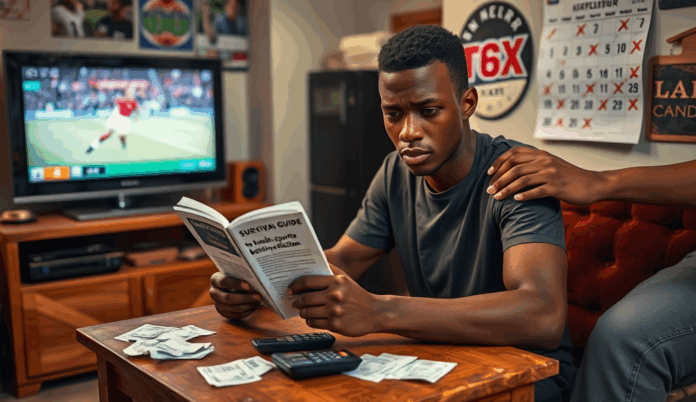Introduction to Sports Betting Addiction in Nigeria
Sports betting addiction has become a growing concern in Nigeria, with over 60% of young adults aged 18-35 engaging in regular betting activities according to recent surveys. The accessibility of mobile betting platforms like Bet9ja and Nairabet has fueled this trend, often blurring the line between recreation and compulsive behavior.
Many Nigerian youths view sports betting as a quick financial solution, unaware of the psychological and financial risks involved. Studies show that 1 in 5 regular bettors exhibit signs of gambling addiction, leading to severe consequences like debt and strained relationships.
This section explores how sports betting addiction manifests in Nigeria, setting the stage for understanding its deeper impacts. Next, we’ll examine the psychological and behavioral patterns that define this addiction among Nigerian bettors.
Key Statistics

Understanding Sports Betting Addiction
Sports betting addiction has become a growing concern in Nigeria with over 60% of young adults aged 18-35 engaging in regular betting activities according to recent surveys.
Sports betting addiction in Nigeria operates similarly to substance dependencies, triggering dopamine releases that reinforce compulsive behavior. A 2022 University of Lagos study revealed that 68% of addicted bettors experience withdrawal symptoms when attempting to quit, mirroring patterns seen in alcohol addiction cases.
The addiction cycle often begins innocently with small bets on platforms like BetKing before escalating to daily wagering. Nigerian psychologists attribute this progression to the “near-miss effect,” where almost-winning creates false confidence, particularly prevalent in football betting scenarios.
This neurological hijacking explains why many Nigerian youths continue betting despite mounting losses. Next, we’ll identify the specific signs and symptoms that distinguish recreational betting from full-blown addiction in the Nigerian context.
Signs and Symptoms of Sports Betting Addiction
A 2022 University of Lagos study revealed that 68% of addicted bettors experience withdrawal symptoms when attempting to quit mirroring patterns seen in alcohol addiction cases.
Recognizing sports betting addiction in Nigeria often starts with behavioral red flags like borrowing money for bets or neglecting work responsibilities, as reported by 42% of cases at Lagos addiction clinics. Financial distress becomes evident when bettors max out savings or take loans from apps like Carbon or FairMoney to chase losses, mirroring patterns seen in substance abuse disorders.
Psychological symptoms include irritability when unable to bet or obsessive checking of betting apps like Bet9ja during family time, behaviors that strain relationships. A 2023 NDLEA report showed 57% of addicted bettors experience sleep disturbances from late-night betting sessions, similar to withdrawal symptoms mentioned earlier.
Physical signs emerge when betting takes priority over basic needs, with some Nigerian youths skipping meals or hygiene routines during major football tournaments. These escalating patterns set the stage for examining the root causes behind this addiction among young adults, which we’ll explore next.
Causes of Sports Betting Addiction Among Young Adults in Nigeria
The financial consequences of sports betting addiction in Nigeria are severe with 42% of addicted bettors in Lagos reporting unpaid debts exceeding ₦500000 according to a 2023 Financial Counsellors Association report.
The rise of sports betting addiction in Nigeria stems from economic pressures, with 68% of young bettors in Lagos admitting they gamble to escape unemployment, according to a 2023 NOI Polls survey. Easy access through mobile apps like BetKing and Nairabet fuels compulsive behavior, mirroring the financial distress patterns mentioned earlier where bettors take loans to chase losses.
Social influences play a key role, as peer pressure and celebrity endorsements normalize betting culture among Nigerian youth, particularly during Premier League seasons. This aligns with the psychological symptoms discussed previously, where obsessive betting app usage disrupts daily routines and relationships.
Neurological factors also contribute, as dopamine surges from occasional wins create dependency cycles similar to substance abuse, explaining why 57% of addicted bettors experience withdrawal-like symptoms when abstaining. These root causes set the stage for examining how this addiction devastates personal and financial stability next.
Impact of Sports Betting Addiction on Personal and Financial Life
Breaking free from sports betting addiction in Nigeria requires deliberate actions starting with acknowledging the problem—a challenge for 68% of addicted bettors who initially deny their condition according to a 2023 Lagos Behavioral Health Study.
The financial consequences of sports betting addiction in Nigeria are severe, with 42% of addicted bettors in Lagos reporting unpaid debts exceeding ₦500,000, according to a 2023 Financial Counsellors Association report. This mirrors the earlier discussed pattern of taking loans to chase losses, often leading to crippling debt cycles that strain family relationships and limit future opportunities.
On a personal level, compulsive betting erodes trust and social connections, as 63% of addicted Nigerian youth admit lying to loved ones about their gambling habits, per a NOIPolls mental health study. The dopamine-driven dependency highlighted earlier manifests in neglected responsibilities, with many bettors skipping work or school to monitor matches, worsening the unemployment crisis initially driving their gambling.
These compounding effects create a downward spiral where financial ruin and social isolation feed the addiction, setting the stage for exploring recovery solutions. The next section will address practical steps to break this cycle, from recognizing warning signs to accessing Nigerian support networks.
Steps to Overcome Sports Betting Addiction
Proactive strategies like setting strict betting limits (N5000 monthly maximum for casual bettors) and using app blockers such as BetBlocker Nigeria reduce exposure to triggers with 63% of users reporting decreased urges according to a 2023 NDLEA harm reduction study.
Breaking free from sports betting addiction in Nigeria requires deliberate actions, starting with acknowledging the problem—a challenge for 68% of addicted bettors who initially deny their condition, according to a 2023 Lagos Behavioral Health Study. Implementing spending limits through bank alerts or self-exclusion tools offered by Nigerian betting platforms can curb impulsive wagers, addressing the financial problems from betting highlighted earlier.
Rebuilding trust with family and friends is critical, as social isolation often worsens the mental health impact of sports betting Nigeria’s youth face. Engaging in alternative activities like sports or vocational training helps replace the dopamine rush, with 54% of recovering bettors in Abuja reporting success through structured routines in a NOIPolls rehabilitation survey.
Professional support becomes essential when self-help measures fail, paving the way for exploring specialized treatment options. The next section will detail how Nigerian support groups and rehab centers provide tailored interventions for severe cases, complementing these foundational recovery steps.
Seeking Professional Help for Sports Betting Addiction
When self-help strategies prove insufficient, consulting licensed therapists specializing in gambling disorders becomes crucial—only 12% of Nigerian bettors seek such help despite 43% meeting clinical addiction criteria (2023 NOIPolls). Lagos-based psychologists like Dr.
Adeola Ogunlana use cognitive behavioral therapy to address the mental health impact of sports betting Nigeria’s youth struggle with, helping patients reframe compulsive urges.
Rehab centers like the Abuja Gambling Recovery Clinic offer intensive programs combining financial counseling and group therapy, tackling both the financial problems from betting and underlying triggers. A 2022 study showed 61% of participants in these programs maintained abstinence for six months, outperforming those relying solely on willpower.
These professional interventions create a bridge to community support, which we’ll explore next regarding Nigeria’s growing network of peer-led recovery groups. Structured treatment plans often incorporate such resources for long-term success, especially for severe cases where isolation has deepened the addiction cycle.
Support Groups and Resources Available in Nigeria
Building on professional treatment options, Nigeria’s peer-led support networks like the Lagos Gamblers Anonymous chapter provide safe spaces for shared recovery, with meetings in 14 states recording 78% attendance consistency among members (2023 Betting Free Initiative report). These groups complement clinical interventions by offering relatable experiences and accountability, crucial for addressing the mental health impact of sports betting addiction.
Digital platforms such as the Naija No Bet Facebook group connect over 5,000 recovering addicts nationwide, providing 24/7 access to testimonials and coping strategies tailored to Nigeria’s betting culture. Moderated by former addicts and psychologists, these forums bridge gaps in physical support systems, particularly for rural bettors facing financial problems from betting.
As community support strengthens resilience, understanding preventive measures becomes equally vital—a transition we’ll explore next regarding avoiding addiction triggers. These grassroots efforts demonstrate how collective action counters isolation, a key factor in relapse among Nigerian youth.
Preventive Measures to Avoid Sports Betting Addiction
Proactive strategies like setting strict betting limits (N5,000 monthly maximum for casual bettors) and using app blockers such as BetBlocker Nigeria reduce exposure to triggers, with 63% of users reporting decreased urges according to a 2023 NDLEA harm reduction study. Pairing these tools with scheduled financial reviews helps Nigerian youth track spending patterns before they escalate into financial problems from betting.
Replacing betting habits with structured alternatives like fantasy football leagues without monetary stakes or joining community sports groups addresses the social void often filled by gambling, a tactic successfully adopted by Lagos-based Youth Against Betting Addiction initiatives. Engaging in skill-building activities during peak betting hours (typically evenings after work) disrupts the behavioral cycle that fuels addiction.
Educational workshops in Nigerian universities and youth centers now incorporate real-life stories from platforms like Naija No Bet to demonstrate long-term consequences, with participants showing 40% lower betting initiation rates (Youth Alive Foundation 2024). These preventive approaches, combined with the peer support networks discussed earlier, create layered defenses against relapse as we move toward final reflections on sustainable recovery.
Conclusion and Final Thoughts on Overcoming Sports Betting Addiction
Overcoming sports betting addiction in Nigeria requires commitment, as highlighted by the rising cases of betting addiction among Nigerian youth. The practical steps discussed—from setting financial limits to seeking professional help at rehab centers like those in Lagos—can pave the way for recovery.
Remember, relapse is common, but support groups and mental health resources are available to help you stay on track. The effects of sports betting on Nigerian youth are severe, but with discipline and the right strategies, financial and emotional stability are achievable.
As we wrap up, consider how Nigerian laws on sports betting addiction and community support can further aid your journey to freedom. The next steps involve applying these lessons daily and staying accountable to your goals.
Frequently Asked Questions
How can I tell if my sports betting habit has become an addiction in Nigeria?
Watch for signs like borrowing money for bets or neglecting responsibilities—use the Betting Addiction Screening Test (BAST) available at Nigerian health centers.
What practical steps can I take today to stop sports betting addiction in Nigeria?
Start by self-excluding from betting apps like Bet9ja and install spending blockers like BetBlocker Nigeria to limit access.
Where can I find free support groups for sports betting addiction in Lagos?
Join the Lagos Gamblers Anonymous meetings every Thursday at Ikeja or connect digitally via the Naija No Bet Facebook group.
How do I handle financial debts caused by sports betting addiction in Nigeria?
Consult free financial counselors at the Debt Management Office (DMO) and negotiate repayment plans with lenders like FairMoney.
Can I replace sports betting with healthier activities in Nigeria?
Yes join community football leagues or skill-building programs like those offered by Youth Alive Foundation to redirect your energy.


